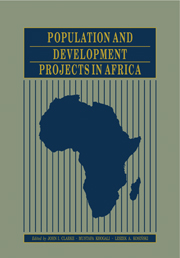Book contents
- Frontmatter
- Contents
- List of Tables
- List of Figures
- List of Contributors
- Preface
- 1 The demographic background to development in Africa
- 2 Development projects and their demographic impact
- 3 Conceptualization of the impacts of rural development projects upon population redistribution
- 4 Capitalism and the population landscape
- 5 Unequal participation of migrant labour in wage employment
- 6 Africa's displaced population: dependency or self-sufficiency?
- 7 Population redistribution and agricultural settlement schemes in Ethiopia, 1958–80
- 8 Populating Uganda's dry lands
- 9 Environmental and agricultural impacts of Tanzania's villagization programme
- 10 Development and population redistribution: measuring recent population redistribution in Tanzania
- 11 Communal villages and the distribution of the rural population in the People's Republic of Mozambique
- 12 A century of development measures and population redistribution along the Upper Zambezi
- 13 Resettlement and under-development in the Black ‘Homelands’ of South Africa
- 14 Development programmes and population redistribution in Nigeria
- 15 Population, disease and rural development programmes in the Upper East Region of Ghana
- 16 Demographic intermediation between development and population redistribution in Sudan
- 17 A typology of mobility transition in developing societies, with application to North and Central Sudan
- 18 Rural population and water supplies in the Sudan
- 19 The impact of the Kenana Project on population redistribution
- 20 Migrant labour in the New Halfa Scheme
- 21 The Gash Delta: labour organization in pastoral economy versus labour requirements in agricultural production
- 22 The impact of development projects on population redistribution to Gedaref Town in Eastern Sudan
- 23 The growth of Juba in Southern Sudan
- Index
3 - Conceptualization of the impacts of rural development projects upon population redistribution
Published online by Cambridge University Press: 05 November 2011
- Frontmatter
- Contents
- List of Tables
- List of Figures
- List of Contributors
- Preface
- 1 The demographic background to development in Africa
- 2 Development projects and their demographic impact
- 3 Conceptualization of the impacts of rural development projects upon population redistribution
- 4 Capitalism and the population landscape
- 5 Unequal participation of migrant labour in wage employment
- 6 Africa's displaced population: dependency or self-sufficiency?
- 7 Population redistribution and agricultural settlement schemes in Ethiopia, 1958–80
- 8 Populating Uganda's dry lands
- 9 Environmental and agricultural impacts of Tanzania's villagization programme
- 10 Development and population redistribution: measuring recent population redistribution in Tanzania
- 11 Communal villages and the distribution of the rural population in the People's Republic of Mozambique
- 12 A century of development measures and population redistribution along the Upper Zambezi
- 13 Resettlement and under-development in the Black ‘Homelands’ of South Africa
- 14 Development programmes and population redistribution in Nigeria
- 15 Population, disease and rural development programmes in the Upper East Region of Ghana
- 16 Demographic intermediation between development and population redistribution in Sudan
- 17 A typology of mobility transition in developing societies, with application to North and Central Sudan
- 18 Rural population and water supplies in the Sudan
- 19 The impact of the Kenana Project on population redistribution
- 20 Migrant labour in the New Halfa Scheme
- 21 The Gash Delta: labour organization in pastoral economy versus labour requirements in agricultural production
- 22 The impact of development projects on population redistribution to Gedaref Town in Eastern Sudan
- 23 The growth of Juba in Southern Sudan
- Index
Summary
Since the second world war, many developing nations have been experiencing rapid economic growth. However, the benefits of such growth have been unjustifiably distributed to a few localities, with large sectors of the population remaining peripheral to these benefits. The necessary structural change for a more balanced distribution of benefits is still in its infant stage.
Among a number of factors which contribute to the unbalanced distribution of economic benefits in developing nations, such as their colonial past and the need to earn foreign exchange and to get quick returns, two may be singled out. First, there is a large subsistence sector in the population, with a low productivity level, low income and little access to innovation and modernization. Facing limited resources, developing nations tend to locate development projects in a few urban and commercial crop-producing areas (e.g. cotton in the Gezira area of Sudan, tea in Kenya), thereby introducing a dualist structure into the economy.
Secondly, due to previously unbalanced growth, the subsistence population sector lags behind, in development, the rapidly-growing urban and commercial crop-producing areas. Due to lack of opportunities and facilities, people in the subsistence sector tend to migrate to these growth centres to improve their living conditions; but although the centres have grown fast during recent decades they do not offer sufficient opportunities for the migrants, and consequently there are high unemployment rates in urban areas.
Information
- Type
- Chapter
- Information
- Population and Development Projects in Africa , pp. 30 - 40Publisher: Cambridge University PressPrint publication year: 1985
